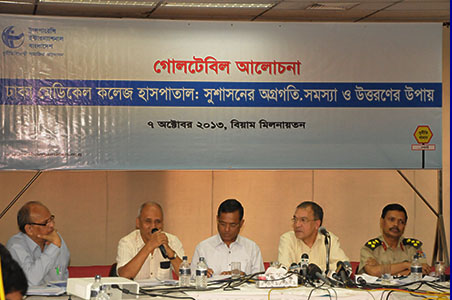Published: 07 October 2013

Prof Dr Khondoker Md Shefyetullah, Director General of the Directorate General of Health Services attended as the Chief Guest, while Brigadier General Mostafizur Rahman, Director, DMCH attended as Special Guest. Among others Dr Samanta Lal Sen, National Chief Coordinator, Burn Unit, DMCH; and Dr Rashid-e-Mahbub, Chairman of the National Committee of Health Rights Movement (NCHRM) attended. Ms. Taslima Akter, Programme Manager, Research and Policy presented the findings of the study and Dr Iftekharuzzaman, Executive Director of TIB moderated the event, held at the BIAM Foundation Auditorium.
Professor Dr Shefyetullah said they could not ensure proper and integrated treatment facilities for all due to insufficient allocation of resources. Despite this limitation, DMCH was providing unremitting health services to a huge number of people. Brigadier General Rahman highlighted the lack of skilled human resources and bureaucratic bottlenecks in recruitment and management resulting in disrupted health services. Dr Samanta Lal Sen suggested involving concerned stakeholders in the procurement process to reduce incidences of corruption.
 The findings shows the absence of long term-plan, lack of transparency and accountability, lack of proper monitoring and evaluation, procrastination in service delivery, absence of regular transfer of hospital staff and absence of Information Officer as major hindrances in establishing good governance at DMCH. Besides, the study also identified a number of challenges including negligence of doctors in maintaining their duty roaster; uncontrolled entry of medical representatives, forcing patients to conduct medical tests from chosen diagnostic centers and clinics; bribery to get services ranging from 20-1000 Tk, bribery in procurement and payment and lack of accountability among doctors, nurses and other staff were responsible for inadequate healthcare facilities.
The findings shows the absence of long term-plan, lack of transparency and accountability, lack of proper monitoring and evaluation, procrastination in service delivery, absence of regular transfer of hospital staff and absence of Information Officer as major hindrances in establishing good governance at DMCH. Besides, the study also identified a number of challenges including negligence of doctors in maintaining their duty roaster; uncontrolled entry of medical representatives, forcing patients to conduct medical tests from chosen diagnostic centers and clinics; bribery to get services ranging from 20-1000 Tk, bribery in procurement and payment and lack of accountability among doctors, nurses and other staff were responsible for inadequate healthcare facilities.
To overcome the existing challenges, TIB proposed a set of recommendations that included among others, appointment of doctors, nurses and other support staff proportionate with the patients; campaign in support of available health services; formation of complaints redress committee; setting up of close circuit camera in the hospital premise; allowing the director to spend up-to 25% of hospital’s income and adoption of a long term development plan for the next 30 years.







